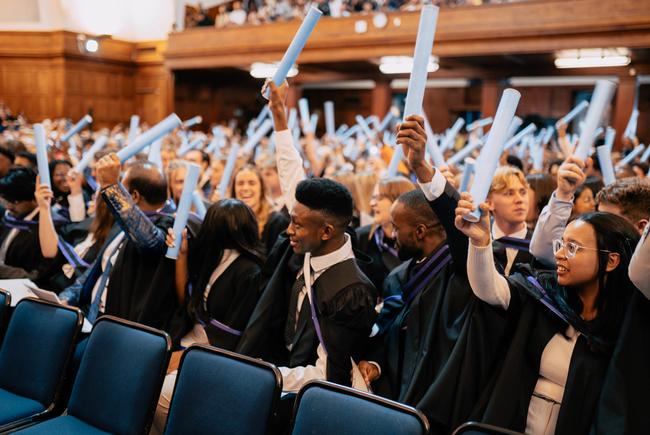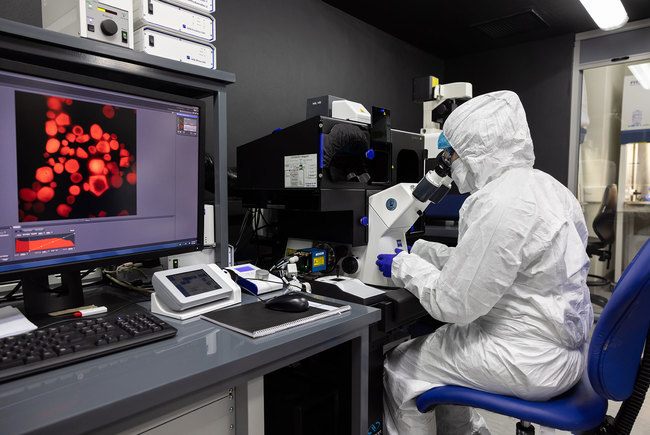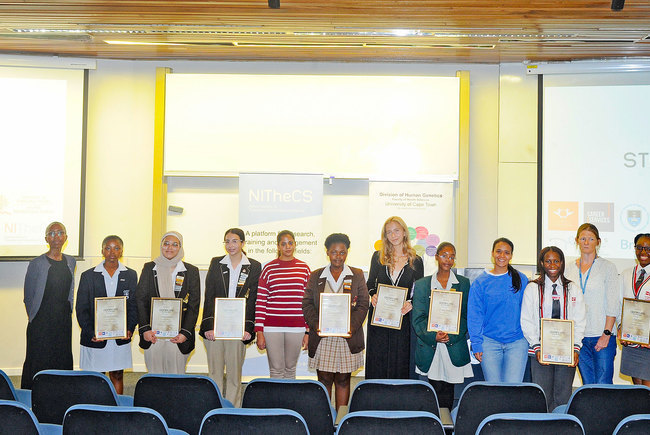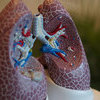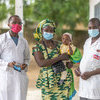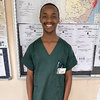Interfaculty research event puts women’s challenges under a microscope
15 December 2022 | Story Nobhongo Gxolo. Photo Je’nine May. Read time 9 min.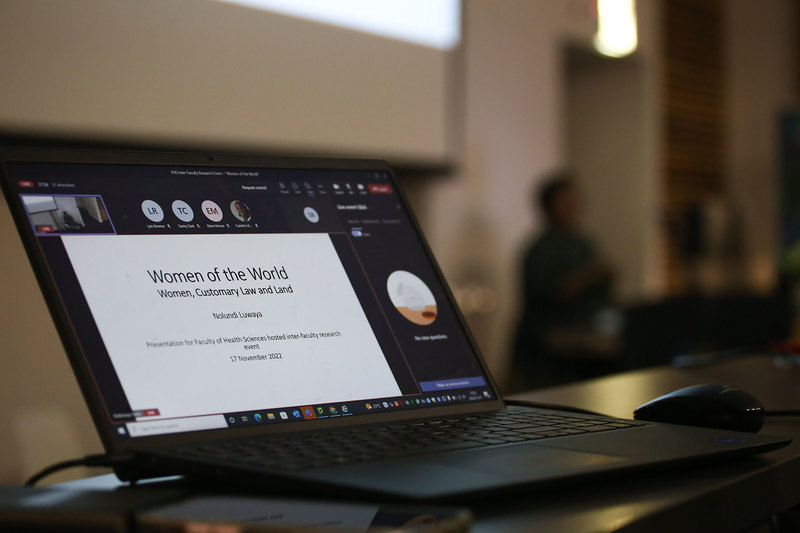
In the lead up to the 16 Days of Activism against Gender-Based Violence, which is commemorated annually from 25 November to 10 December, the University of Cape Town’s (UCT) Deputy Vice-Chancellor (DVC) for Research and Internationalisation Professor Sue Harrison, hosted the Faculty of Health Sciences’ (FHS) interfaculty research event in collaboration with the faculty dean, Associate Professor Lionel Green-Thompson. This is part of a series of events hosted with each of UCT’s faculty deans.
The first DVC event in the series, conceptualised by UCT’s Research Task Team, was hosted by the Faculty of Engineering & the Built Environment on 6 June 2022. The FHS event on 25 November was the fifth in the series. This hybrid event had its physical component at the Neuroscience Institute auditorium at Groote Schuur Hospital.
Preoccupied with how to enable research at the university to happen in “different and interesting” ways, the Research Task Team premises its work on UCT’s Vision 2030 strategy – with a focus on challenges, and research with a societal impact. This strategy relies on research to produce answers to the “complex problems of today and tomorrow”.
Professor Harrison explained that collaboration and integrated research methods and techniques are the cornerstone for cross-disciplinary and cross-faculty work.
“Work which happens across faculties is becoming increasingly important,” she said.
The idea driving the series was to have “short, interesting ways of looking into research that gets done on a [particular] topic, but by different people”. That’s what birthed the interfaculty conversational series.
The country’s problems are a function of its historic landscape
Chairing the programme, FHS director of research, Dr Yolande Harley, spoke about FHS’s interdisciplinary work. She mentioned the faculty’s three University Research Committee-accredited institutes: the Neuroscience Institute, the Cape Heart Institute, and the Institute of Infectious Disease and Molecular Medicine whose work spans across disciplines – including extensive collaboration with members from other faculties and institutions. Additionally, the FHS has 11 accredited research centres and 23 units that follow similar models.
The theme for the day was “Women of the World”. Dr Harley introduced the speakers, inviting them to highlight the gender dimension of their work and the importance of holding these cross-cutting perspectives in their specific disciplines - to encourage the exploration of different ways researchers can broaden their way-of-working.
First speaker, Nolundi Luwaya, is the director of the Land and Accountability Research Centre in the Faculty of Law. In her talk, Luwaya showed two maps demonstrating the portion of land distribution to black South Africans: the 7% allocated in 1913, and the additional 8% allocated in 1936.
“Our research is about navigating both the present-day impact of this history but also having a deep understanding of the historical impact of this history.”
“Our research is about navigating both the present-day impact of this history but also having a deep understanding of the historical impact of this history. It’s particularly important, we believe for the challenges faced by women, to have an acute understanding of how law was used to construct this very picture,” she said. “The work we’re doing looks both backwards and forwards; discussing [women’s issues] within that historical context of colonialism, apartheid constructs, misinterpretations and in some instances distortions. [Constructs] that have sought to undermine the rights, particularly in terms of land, [that] women might hold in these systems.”
Associate Professor Elena Moore, based in the Department of Sociology at the Faculty of Humanities, was the second speaker. For several years she’s been working on questions around who does what for whom in families and why. Linked to this is the idea of how flows of support within and across families are explained.
Associate Professor Moore investigates this within the South African context. “What happens when the caregiver, most notably older women, require care themselves?” she asked.
Her new research programme investigates family caregiving of older persons across Southern Africa, posing the question: What happens when older persons can no longer provide the practical caregiving they’ve been giving over several crises and many decades – and instead require practical care support themselves?
This prevalent problem of the shift that happens when someone, often from a younger generation, must step in to be the primary carer of the caregiver, be the household breadwinner taking on responsibility of younger dependants, while balancing the care responsibilities of their own life remains undocumented, poorly understood, not sociologically theorised and unsupported.
Cross-faculty perspectives on the challenges of women
Associate Professor Ameeta Jaga in the School of Management Studies and the deputy dean of Transformation and Inclusion in the Faculty of Commerce, spoke next. Referring to herself as a work–family scholar, Associate Professor Jaga is curious about the interface between paid work and family responsibilities, with a particular interest in mothers’ experiences in low-income settings.
“Working within the South African context has helped me realise that some pro-feminist policies miss these women completely. And northern framings of concepts such as family, and what it means to be a breadwinner, don’t accurately represent these women,” she said.
“My work tries to explore new ways of understanding work–family questions, particularly on motherhood ... [while seeking] to promote equitable policy and to make a difference in people’s lives.”
“You’re not just a researcher writing publications and building capacity – you’re a learner, you’re an observer, you’re an agent of advocacy.”
The fourth speaker, Professor Lillian Artz, is the director of the Gender, Health and Justice Research Unit at the FHS. She has published widely on domestic violence, sexual offences, incarcerated women, and women’s rights to freedom and security in Africa.
Describing her work, she said: “You’re not just a researcher writing publications and building capacity – you’re a learner, you’re an observer, you’re an agent of advocacy, you’re conducting policy and law reform developments, you’re responding to the needs of our communities and to specific calls for proposals, you are driven sometimes by donor priorities and expectations, you’re consultants, you’re technicists. It’s a challenging context.”
Solving future problems depends on interdisciplinary approaches
Dr Mercy Brown-Luthango, a senior research officer at the African Centre for Cities in the School of Architecture, Planning and Geomatics in the Faculty of Engineering & the Built Environment, was the last presenter. Her focus was on the intersection of urban violence and spacial inequalities, investigating how this impacts women, women’s freedom, and their quality of life.
Through work spanning a couple of years, her team found that, “Women are disproportionally affected by poor living environments, and associated violence in multiple ways and at multiple scales. That physical attributes of the built environment like informal settlements, lack of pathways, narrow streets, lack of lighting, lack of water and sanitation services (because of our specific needs) put women, especially, at risk of violence and violent crime.”
The speakers raised problems and challenges women face which are deeply systemic, economic, social, psychological, political, educational – and in many ways entwined with the idea of access. What Dr Brown-Luthango mentioned, and what was a thread throughout the presentations, was that these complex problems require “holistic, interdisciplinary and intersectoral approaches to finding appropriate solutions. The silo-ed, one size fits all approach does not work”.
“The women presenting today will offer a new vision of a world in which many voices offer us an opportunity to speak with multiple disciplines together about a future we may not quite be imagining.”
Recognising the impact of women on the South African story, Associate Professor Green-Thompson said that even with the progress made, women continue to be marginalised and vulnerable.
“Reflecting about the past – the legacy of women in our faculty and within the greater university, our present – the eminent role that women now occupy as thinkers in the university, and very often the sources of the solutions which we so desperately need for our world … [And] the future – that future which is promised if we listen with a different sense of compassion, hear the lessons that are being provided in forums like these, today, with some humility and openness to changing the course that we may need to take.
“The women presenting today will offer a new vision of a world in which many voices offer us an opportunity to speak with multiple disciplines, together, about a future we may not quite be imagining.”
 This work is licensed under a Creative Commons Attribution-NoDerivatives 4.0 International License.
This work is licensed under a Creative Commons Attribution-NoDerivatives 4.0 International License.
Please view the republishing articles page for more information.
Faculty of Health Science News








